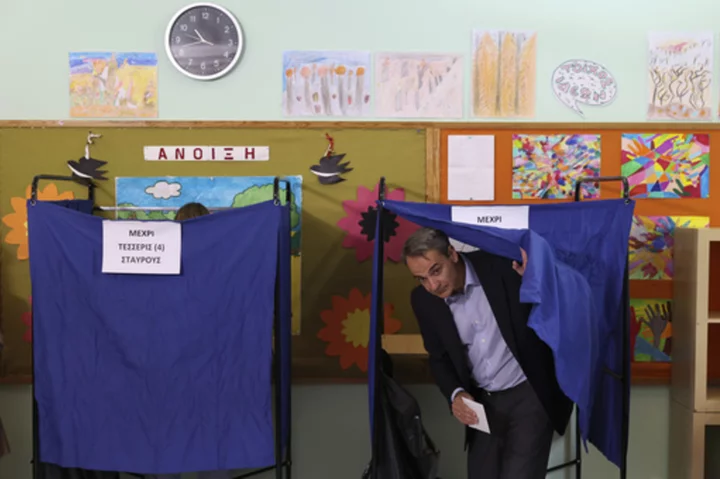ATHENS, Greece (AP) — Exit polls in Greece’s parliamentary elections show Prime Minister Kyriakos Mitsotakis’ conservative party is in the lead but is unlikely to win enough seats in parliament to form a government outright.
If confirmed by official results, Mitsotakis will have to seek coalition partners to secure a majority in the 300-seat parliament. If coalition talks fail, a second election could be held in late June or early July.
Exit polls showed Mitsotakis’ main rival, former Prime Minister Alexis Tsipras, 48, and his left-wing Syriza party, in second place. The polls projected New Democracy winning between 121 and 125 parliamentary seats, with Syriza at between 86 and 89 seats, with a total of either six or seven parties making it past the threshold of 3% of the vote to enter parliament.
Sunday’s election is Greece’s first since its economy ceased being under strict supervision by international lenders who had provided bailout funds during the country’s nearly decade-long financial crisis.
The vote was held under a new electoral law of proportional representation, which makes it particularly difficult for any one party to win enough votes to form a government on its own. But for the next election, the law will change again, shifting to a system that rewards the leading party with bonus seats and making it easier for it to gain a majority of parliamentary seats.
Mitsotakis, a 55-year-old Harvard-educated former banking executive, had been steadily ahead in opinion polls in the runup to the election. But his popularity took a hit following a Feb. 28 rail disaster that killed 57 people after an intercity passenger train was accidentally put on the same rail line as an oncoming freight train. It was later revealed that train stations were poorly staffed and safety infrastructure broken and outdated.
The government was also battered by a surveillance scandal in which journalists and prominent Greek politicians discovered spyware on their phones. The revelations deepened mistrust among the country’s political parties at a time when consensus may be badly needed.
Greece’s once-dominant socialist Pasok party is likely to be at the center of any coalition talks. Overtaken by Syriza during Greece’s 2009-2018 financial crisis, the party has been polling at around 10%. Its leader, Nikos Androulakis, 44, was at the center of the wiretapping scandal in which his phone was targeted for surveillance.
But Androulakis’ poor relationship with Mitsotakis, whom he accuses of covering up the wiretapping scandal, mean a deal with the conservatives would be difficult. His relationship with Tsipras is also poor, accusing him of trying to poach Pasok voters.
In power since 2019, Mitsotakis has delivered unexpectedly high growth, a steep drop in unemployment and a country on the brink of returning to investment grade on the global bond market for the first time since it lost market access in 2010, at the start of its financial crisis.
Debts to the International Monetary Fund were paid off early. European governments and the IMF pumped 280 billion euros ($300 billion) into the Greek economy in emergency loans between 2010 and 2018 to prevent the eurozone member from bankruptcy. In return, they demanded punishing cost-cutting measures and reforms that saw the country’s economy shrink by a quarter.
____
Theodora Tongas, Demetris Nellas and Nicholas Paphitis contributed to this report.

